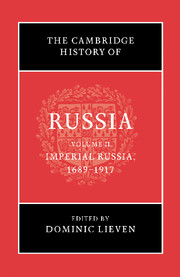Book contents
- Frontmatter
- Introduction
- Part I Empire
- Part II Culture, Ideas, Identities
- Part III Non-Russian Nationalities
- Part IV Russian Society, Law and Economy
- 11 The elites
- 12 The groups between: raznochintsy, intelligentsia, professionals
- 13 Nizhnii Novgorod in the nineteenth century: portrait of a city
- 14 Russian Orthodoxy: Church, people and politics in Imperial Russia
- 15 Women, the family and public life
- 16 Gender and the legal order in Imperial Russia
- 17 Law, the judicial system and the legal profession
- 18 Peasants and agriculture
- 19 The Russian economy and banking system
- Part V Government
- Part VI Foreign Policy and the Armed Forces
- Part VII Reform, War and Revolution
- Bibliography
- Index
- Map 5. The Russian Empire (1913). From Archie Brown, Michael Kaser, and G. S. Smith (eds.) Cambridge Encyclopedia of Russia 1982.">
- Plate Section">
- References
11 - The elites
from Part IV - Russian Society, Law and Economy
Published online by Cambridge University Press: 28 March 2008
- Frontmatter
- Introduction
- Part I Empire
- Part II Culture, Ideas, Identities
- Part III Non-Russian Nationalities
- Part IV Russian Society, Law and Economy
- 11 The elites
- 12 The groups between: raznochintsy, intelligentsia, professionals
- 13 Nizhnii Novgorod in the nineteenth century: portrait of a city
- 14 Russian Orthodoxy: Church, people and politics in Imperial Russia
- 15 Women, the family and public life
- 16 Gender and the legal order in Imperial Russia
- 17 Law, the judicial system and the legal profession
- 18 Peasants and agriculture
- 19 The Russian economy and banking system
- Part V Government
- Part VI Foreign Policy and the Armed Forces
- Part VII Reform, War and Revolution
- Bibliography
- Index
- Map 5. The Russian Empire (1913). From Archie Brown, Michael Kaser, and G. S. Smith (eds.) Cambridge Encyclopedia of Russia 1982.">
- Plate Section">
- References
Summary
Throughout the imperial period Russia’s political and social elites were drawn overwhelmingly from members of the hereditary noble estate (soslovie). Even in 1914 the core of the social elite were members of great aristocratic landowning families. This group overlapped to a still considerable but ever decreasing degree with the political elite, whose core were senior civilian and military officials. The aristocrats were all from hereditary noble families, these families usually being both old and titled, as well as rich. Most of the military and bureaucratic elite were also by birth from the hereditary nobility, the majority still coming from well-established though not usually rich land-owning families of the provincial gentry, or sometimes from well-entrenched service noble ‘dynasties’. The still relatively small minority of senior generals and bureaucrats who were not noble by birth had acquired this status automatically by reaching senior ranks in the civil and military service.
There were really only two relatively minor exceptions to the rule that the imperial elite was made up of hereditary noblemen. During the whole period senior clerics of the Orthodox Church, all of them drawn from the celibate monastic clergy, played a significant role in tsarist government and society. Since the Church was firmly subordinated to the secular ruling elite and enjoyed limited status in aristocratic society, perhaps the senior clergy is best defined as a sub-elite. The other non-noble sub-elite worth mentioning is the new Russian business class which had emerged since the middle of the nineteenth century and whose national centre was Moscow. Whereas before the 1850s most great business fortunes either were founded by the nobility or were absorbed into it by marriage or ennoblement, this became much less true in the last three generations of Imperial Russia, when a distinctive Moscow business elite and subculture emerged and came to dominate Muscovite society.
- Type
- Chapter
- Information
- The Cambridge History of Russia , pp. 225 - 244Publisher: Cambridge University PressPrint publication year: 2006
References
- 16
- Cited by

